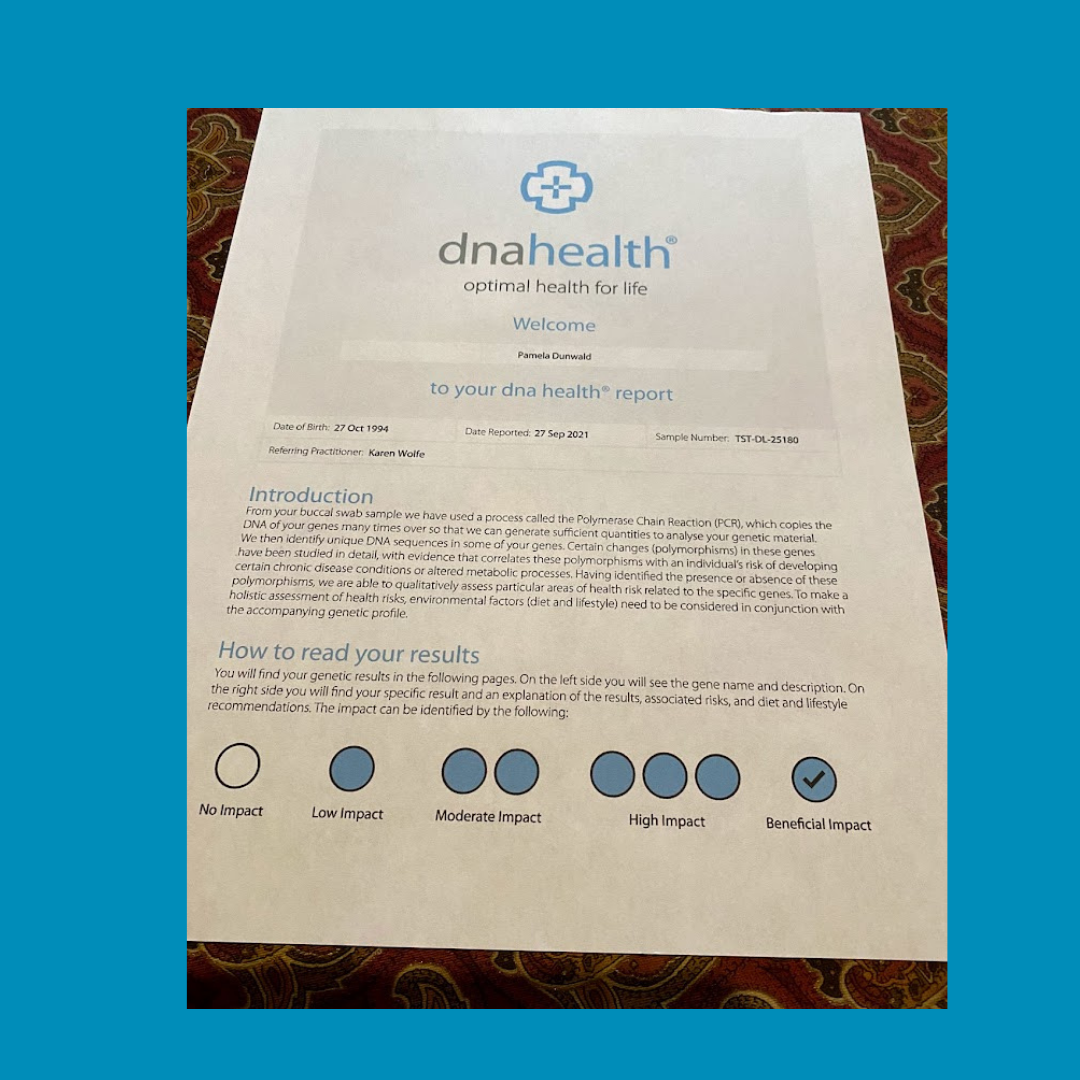
Did you ever think about this? If you knew what diseases you might be prone to and had the suggestions to turn off that gene with lifestyle changes and good nutrition would it be worth knowing? What if you were adopted and not sure of your family medical history?
Today we are going to talk about just that. Nutrigenomic Testing is DNA testing that looks at your data and puts together a comprehensive report (mine was 31 pages) that looks at your risk of developing certain chronic disease conditions, altered metabolic processes and can even tell you what vitamins you have trouble absorbing. It is a picture of your health risks that are related to different genes. The purpose of the test is to look at a holistic assessment of our health risks that can be seen with your gene make up. It can help you look at environmental, nutrition, diet and lifestyle habits that should be considered in your personal health goals. This process looks at potential root causes vs waiting until you have a chronic illness or disease to then take an active role treating it. I feel it empowers you to be proactive with your health.
I just received my results this past week and the process was very simple. I requested a profile from my Functional Medicine/Holistic Health Coach Dr. Karen. The kit came in the mail with everything I needed. I had to poke my finger as this company felt is more accurate than the buccal swabs (saliva test). I had to put blood drops on each of 5 circles. Shipping instructions and paid return envelope were provided and the delivery company came and picked it up from me at the house. Very simple!!
Next Dr. Karen notified me when the results were back about 2 weeks later and we set up my 30-minute consultation to review my findings.

The report was very easy to read yet gave you all the science you wanted plus the recommendations to follow to help “turn off” that gene that my predispose you to a health condition.
I am going to share some of my results so you can see how you might benefit from knowing this information.
My only HIGH RISK category was Inflammation. That makes sense. My mom is debilitated with Rheumatoid Arthritis and I show signs of arthritis all over my body. This wasn’t a big surprise but combined with the other information I received I know feel empowered to be able to do something about it. I was already taking high quality antioxidant supplements but now I had more tools in the tool box such as lifestyle changes, and what foods are best to eat and avoid that contribute to increased inflammation.

I had 3 areas of MODERATE RISK; Methylation, Oxidative Stress, and Lipid or Fat Metabolism
I did find out a few other good pieces of information. I have a salt sensitivity. What that means if I have high blood pressure or heart failure for me, salt will play a big role in managing any extra fluid I may have. I also found out I have a sensitivity to gluten. I am not gluten “intolerant” but I have to agree I do struggle with bloating, feeling full, gas, etc when eat a high gluten meal. I never put the 2 and 2 together and just blamed it on eating the “carbs”.
Some good news was that I do not have any genes that would predispose me to cancer except for one gene associated with colon cancer. I did the Cologuard test and it did come back positive but my colonoscopy was good. It all comes together when you have all the details!
My LOW RISK areas were Detoxification (good liver function), Bone Health (good for not having osteoporosis) and Insulin Sensitivity which puts me at lower risk for Diabetes.
My 3 Vitamins that I don’t absorb very well based on my inherited genes are Vitamin A, Vitamin D, and Vitamin B12. Dr. Karen has also recommended a few other blood tests based on the gene results to further dig deeper into what I need to do.
The company also gave me a “lifestyle diet” that would best suit my gene/DNA make-up. The diet for me is the Mediterranean Diet. Fish, Veggies, Whole grains, etc. That topic is for another day!!
The last thing I will share was a bit scary to me. I have the APOE 4 gene that increases my risk for late onset Alzheimer’s Disease 40-50%. My grandpa on my mom’s side did have the late onset Alzheimer’s. He showed signs in his 80s and lived to 92 and also had Parkinson’s Disease also. Risk factor’s to “turn on” this gene are increased alcohol intake, and smoking which I don’t need to worry about either. Those 2 lifestyle things alone can help keep that gene turned “off”. Of course, there are no guarantees however, you are empowered with some great information vs. being left in the dark. You have specific information geared just towards you and now you can take action on the things that matter most!

Here is what the categories that showed in my test. I have created a checklist for you with the categories.
Lipid Metabolism: Heart health depends on a host of several things such as environment, dietary lifestyle, genetics. Certain genes effect your cholesterol levels. Your genes can impact your good cholesterol and your bad cholesterol. I did have a beneficial gene here that helps me to have a lower cholesterol level and lower bad cholesterol level. I also have a gene that promotes a high good cholesterol gene. My HDL or good cholesterol is always high between the 70-80 range. Normal is around 35. This was a positive category of genes for me.
Methylation: This was a moderate impact area for me. It tells me that I may not be able to metabolize or utilize the B Vitamins as well as we would like. The B vitamins are helpful in protecting your genes, to keep them from suffering from wear and tear. These vitamins turn on and off genes as well as assist in the gene repair process. The process of repairing our DNA is called Methylation. B Vitamins are not needed in large amounts but crucial in repair and producing new DNA. My high-risk gene here was also related to inflammation which can decrease the methylation process.
Detoxification: The news for me is better in this category. I scored a low impact here and things in this category are working in my favor. The management of detoxification in your body are handled primarily by a group of enzymes. The most common one we have heard the most about is Glutathione. This comes from your liver. Glutathione helps to make the toxins more water soluble and more easily excreted though your urine and sweat. Certain vegetables can be beneficial in helping to remove these toxins from your body. Two genes in this category can cause carcinogenic effects and may lead to some cancers. Prostate and Breast Cancer to be more specific.

Inflammation: This was my “high priority” section of the test. This is where I am at the most risk. Inflammation is a normal response and is essential step in tissue healing. You know when you get a sore or bug bite it turns warm and red? This is inflammation and your body going to work to repair. This process is controlled by your genes that regulate your inflammatory process in your body. Sometimes these genes do not get “switched off” the inflammatory process continues to go on. A priority in this area can increase your chance of getting some common disorders know as obesity, heart disease, arthritis, and inflammatory bowel disease and have been associate with chronic low-grade inflammation.
Well, let’s see. I have a weight issue we are working on (down 28 lbs so far yay!!) arthritis, and have had some bowel issues. Enough of that!! I am determined to tune my body up and follow the recommendations to “turn off” those genes that do not serve me as well as some of the others!!
Oxidative Stress: I scored moderate risk here and had one high risk gene. Free radicals can be compared to the exhaust of a car. You put gas (energy) into your car (body) it circulates and your engine (organs, tissues, muscles, brain, etc) is able to run. Your body/car can run as long as it has fuel (food). The process of “burning” the gas/food leads to an exhaust (free radicals) production. We will stop the car analogy here and just talk about your body!!
Free radicals that are circulating around your body are highly reactive. They can damage DNA, cells membranes and proteins. Anti-oxidants can be found in certain foods or nutritional supplements that act as scavengers to scoop up these free radicals and make them non-reactive and render them harmless. Fruits and Veggies have the highest anti-oxidant properties of all the food groups. The best form of protection is your own body’s anti-oxidant defense mechanisms in the form of enzymes. I need to make sure I am getting extra anti-oxidants daily to “turn off” this one gene variant. It also suggests I make sure I am getting my Omega 3’s.

Bone Health: Our bones are continuing to dissolve old bones and create new bone tissue. Once we hit the age of 30 our bone mass starts to reduce. This is especially true for women after they reach menopause. Using the most current research in genetics and nutrition, both play an important role in determining your over all bone health. I had a low impact score for bone health so that is good.
Insulin Sensitivity: Insulin is a hormone that helps your body utilize the glucose (sugar) from the foods you eat and drink. It helps get the glucose into your cells so it can be used for energy and organ function. The research suggests that being insensitive to insulin or resistant to insulin can lead to a greater risk of Obesity and Type II Diabetes, high blood pressure, heart disease, and disrupted fat metabolism. I scored low impact here and actually had a good gene that lowers my risk.
There you have it, my experience with Nutrigenomic Testing. I am so happy I decided to have it done. I feel more in control over my health now. Some people might be afraid and don’t want to know because they feel that knowledge would impact them negatively and they would worry. I get it and I can see both sides. For those of you that are like me, and want more control over what you can do to improve your health and reduce the risk of chronic disease then you may want to consider getting the testing done.
I am so fortunate to be able to work with a team of wellness professionals that we can help people impact their health in such a big and powerful way!
If you would like to know more about how you can get the testing done including cost, how the process works, and the follow up consultation go ahead and click here and we will send you more information. This is a big step for many and we don’t take that lightly. We will ask you to schedule a complimentary 15-minute call to discuss what your goals are prior to taking the test to make sure we can meet your needs.
Go ahead and grab your CHECKLIST here.
Thanks for taking time out of your busy schedule to stop by and visit our blog post. Please feel free to leave a comment or let us know what topics around health and issues affecting you, or your elder parents or spouse and we will be sure to look at it and work it into our blog schedule.
Talk to you soon,
Pam
Resources: https://www.dnalife.healthcare/


